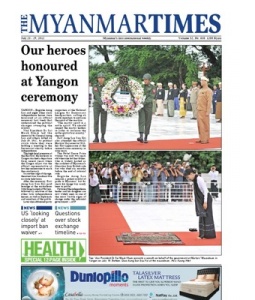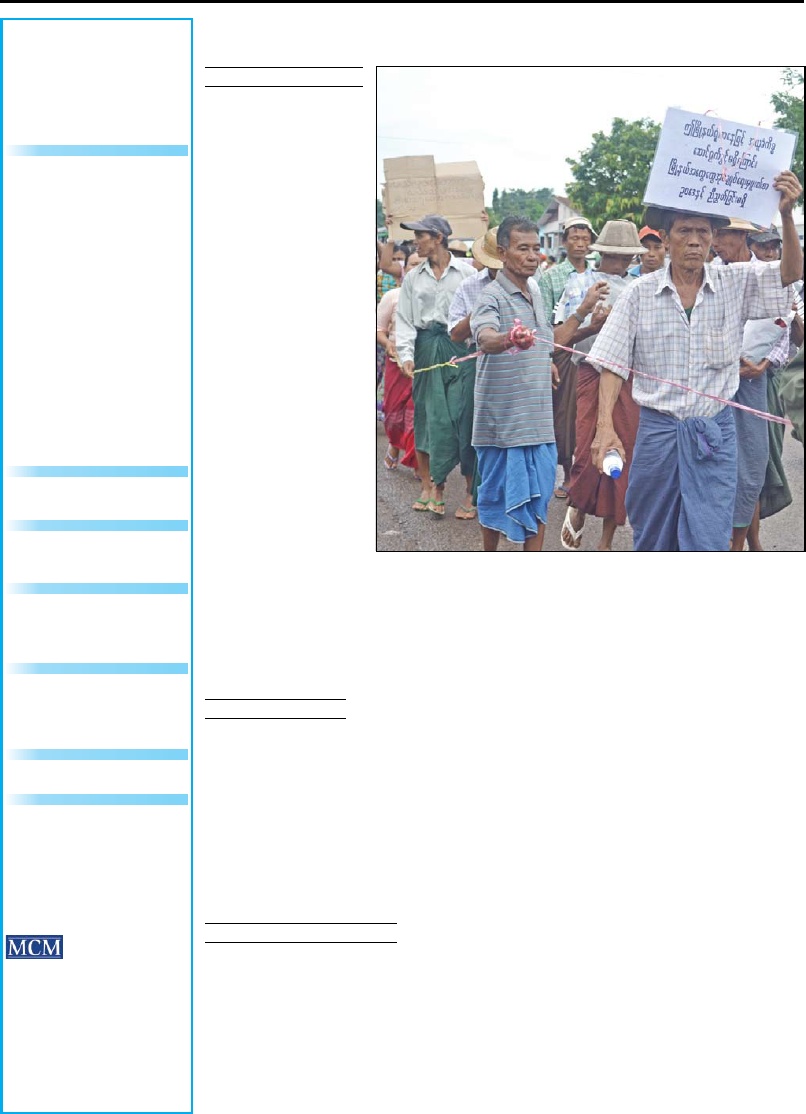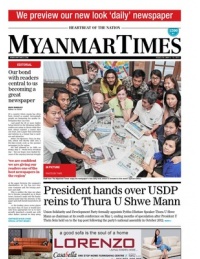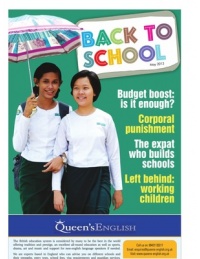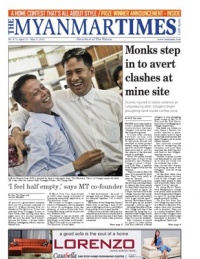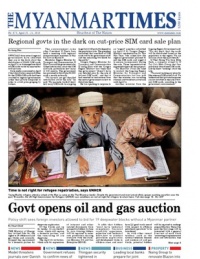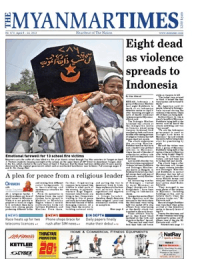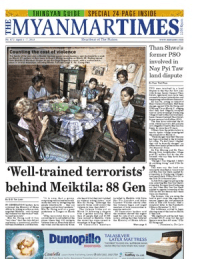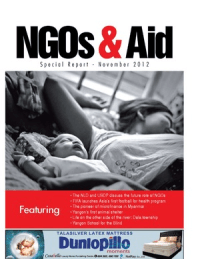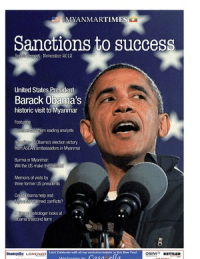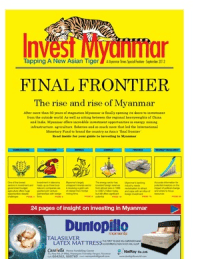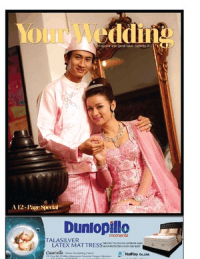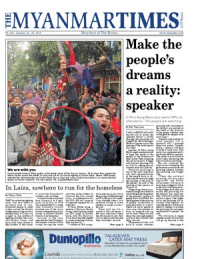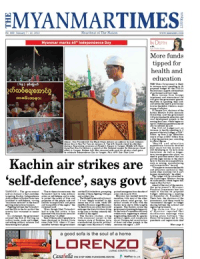myanmar
times
t H e
July 23 - 29, 2012
Myanmar’s first international weekly Volume 32, No. 636 1200 Kyats
YANGON – Bogyoke AungSan and eight other slainindependence heroes werehonoured at an officialceremony last week thatunderscored the politicalchanges sweeping thecountry. Vice President Dr SaiMauk Kham led thememorial for General AungSan and others killed onJuly 19, 1947, by politicalrivals while they wereholding a meeting in theSecretariat shortly beforeindependence.The high-level presence atthe Martyrs’ Mausoleum in Yangon marked a departurefrom recent years whenthe Yangon mayor was theofficial representative atlow-key ceremonies to markthe anniversary.In another sign of change,the event was broadcast liveon state television. After the ceremony, Daw Aung San Suu Kyi paidhomage at the mausoleumwith three baskets of flowers,followed by relatives of theother late independenceheroes, as well as diplomatsand members of the public.Later she addressed partysupporters at the NationalLeague for Democracyheadquarters, calling onyouth members to embracethe spirit of the martyrs.“The martyr spirit is anoble spirit. We shouldrespect the martyr leadersin order to increase thenoble spirit of our country,”she said.Daw Aung San Suu Kyialso attended the officialMartyrs’ Day event in 2011,her first appearance at theremembrance ceremony innine years.The Nobel Peace Prizewinner was only two yearsold when she lost her father,who is widely hailed asthe architect of Myanmar’sliberation from British rulebut who died six monthsbefore the end of colonialrule.Bogyoke Aung Sanremains a potent symbol of pride in Myanmar, but foryears his image was rarelyseen in public.Pictures of the independenceleader and his daughter arenow widely seen in one of the most visible signs of change under the reformistgovernment. –
AFP
Our heroeshonouredat Yangonceremony
NEWS
US ‘lookingclosely’ atimport banwaiver
>7
NEWS
Questionsover stockexchangetimeline
>12-13
Top: Vice President Dr Sai Mauk Kham presents a wreath on behalf of the government at Martyrs’ Mausoleum inYangon on July 19. Bottom: Daw Aung San Suu Kyi at the mausoleum.
Pics: Kaung Htet
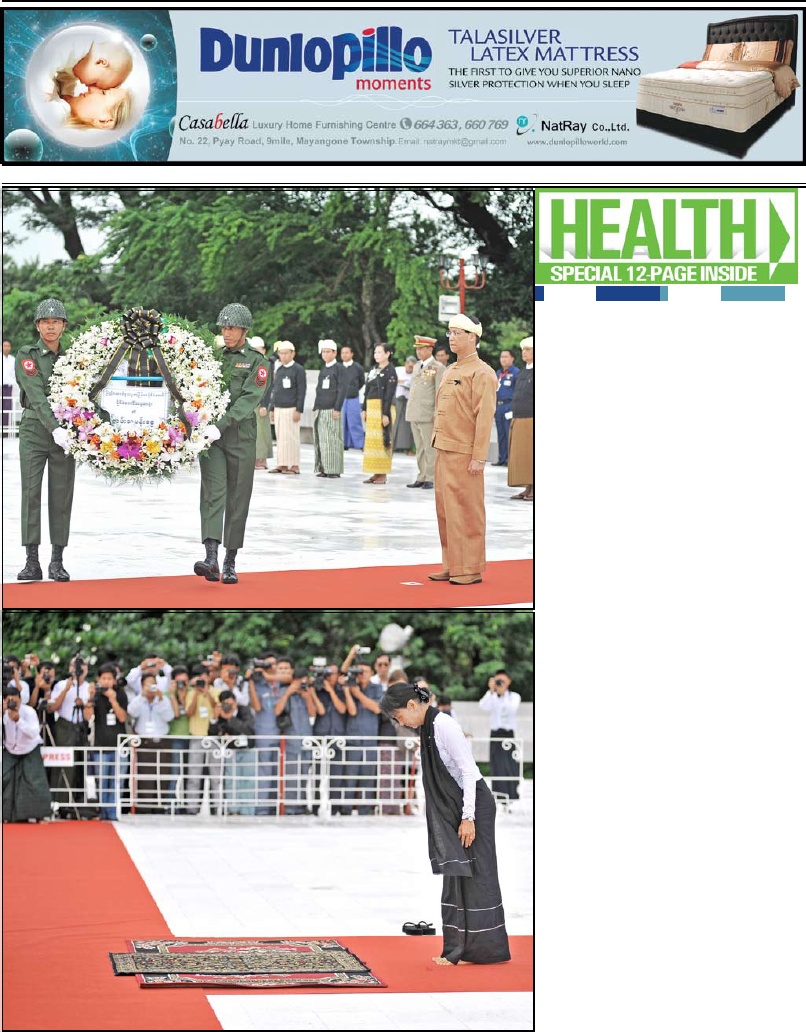






C
omment
the
M
yanMar
t
iMes
2
July 23 - 29, 2012
The Mail Box
Got something to say? We want to hear from you. Address all correspondence to the Editor,
The Myanmar Times
(English). We endeavour to respond to all correspondence in a timely manner.Email: your.myanmar.times@gmail.com
IN general, governments react tochanges in foreign lands basedon their own selfish interests, noton whether those changes areinherently good or bad.That was clearly demonstratedby the differing responses of theworld’s superpowers, China and theUnited States, to the sweeping andsudden reforms in Myanmar.When President U Thein Seinreplaced former Senior GeneralThan Shwe last year, there wasprofound skepticism in the West,especially in Washington, aboutwhether his reformist moves weresincere.The US and other formerlyrabid Myanmar bashers expressedbegrudging encouragement in the“okay, but still could do better”schoolmarmish style.Taking a different tack, theChinese expressed unreservedgoodwill towards U Thein Sein andhis new government. They did thatdespite grave misgivings about hisreforms, and their horror at thedecision to suspend work on thegiant Myitsone dam on Myanmar’sborder with China.But Beijing issued nosanctimonious rebukes; instead, itcontinued doing what it has alwaysdone – trading with and investingheavily in its strategically keysouthern neighbour.U Thein Sein’s team also went onintroducing reforms in their ownway and at their own pace, so thatit was soon apparent that, despiteWestern worries, they were indeedsincere.Last month, the president vowedto introduce a “second wave of reforms”, including a minimumwage law and the privatisation of sections of the education, energy,finance and health sectors.On the political front, he launchedthe “second wave” earlier thismonth by freeing 46 prisoners,including several well-knownpolitical dissidents. Indeed, any lackof sincerity came more from the USand other Western nations, which,having promised to reciprocate eachreformist step taken by Nay PyiTaw, instead dallied and hedged.Last week Washington finallyeased some of its remainingsanctions to permit American firmsto invest in Myanmar.Unlike US companies in Ethiopia,Saudi Arabia, Vietnam and otherrepressive spots, however, thosegoing into newly democraticMyanmar face daunting hurdles.They must, for instance, explaintheir companies’ policies regardinghuman rights, corruption,social responsibility and theenvironment.Meanwhile, Washington’s ban onimports from Myanmar, which NayPyi Taw says is shackling industrialgrowth and job creation, remainsin place. As if that were not badenough, President Barack Obamaeven signed an executive order tobroaden the remaining sanctions.Now sanctions encompassactions that weaken reform, violatehuman rights, instigate ethnicstrife, involve arms deals withNorth Korea, criticise the ChicagoWhite Sox and insufficiently extolbasketball. Well, no, not the lasttwo, of course, but really the crabby,half-heartedness of it is deeplyvexing, to say the least.Luckily for Washington, it nowappears that the Chinese mightshoot themselves in the foot andlose their frontrunner status.They risk doing that, not by American-style whining about thedepth or sincerity of reform, butbecause they fear U Thein Sein ismoving too fast and too broadly.China’s state media has alreadywarned that democracy may notwork for Myanmar.Last month, the CommunistParty-run
Global Times
assertedthat U Thein Sein’s “excessive andhasty” moves towards “Western-style democracy” may be dangerousand “provide chances for all kindsof extremists”.The article highlighted recentcommunal clashes in Rakhine Statethat left many dead and thousandshomeless, and it said that suchconflicts “may get worse and run outof control” if reforms continue. Actually, China’s major concernis that full democracy will flowerin Myanmar and will becomeentrenched and successful.Then, like equally authoritarianLaos and Vietnam, it will faceincreased pressure to start reformsand democratise itself.Thus, for equal and oppositereasons, China and the US arepulling Myanmar in oppositedirections. If U Thein Sein can keephis cool, he will cannily play themoff against each other and reap thebenefits from both.
Giants pull Myanmarin different directions
I HAVE a confession to make:I’m a petrol head. I love cars,motorcycles, motorboats andairplanes – basically anythingthat makes a lot of noise, burnsfossil fuel and goes fast.Before the ministries of railwaysand commerce announced animport substitution programaimed at removing older vehiclesfrom the road, I was also the proudowner of a 1970s-era VolkswagenBeetle. It was a little rusty andhad a very indecisive manualgearbox but I loved it.However, when the overagecar import substitution wasannounced my wife and I madethe decision that “Molly”, as we’dnamed the car, had to go.In selling the car we made a smallprofit, which was far smaller thanit might have been if we’d waited afew weeks but substantially morethan many people, who effectivelylost whatever they paid for theirvehicles.The problem was that somepeople received advance noticethat the program was about to beannounced, after which the oldestcars on the road would becomevaluable commodities. And theyused that information ruthlesslyto buy older vehicles at the lowestpossible prices from people who,like most of us, were unaware of the impending announcement.It was, in effect, insider tradingand it left the mostly poor ownersof these old vehicles in a difficultposition, having sold what was avital family asset just days beforeprices doubled or tripled. The newprices meant that few could affordto buy a replacement vehicle.Since the first announcementthe import substitution programhas undergone several smalladjustments, been suspended,revived and adjusted again – allwithin nine months. A senior private banker toldme some months ago that theCentral Bank needed to be clearin its decision making and informthe market immediately of itsintentions. I feel the same logicneeds to apply to the car market:a plan needs to be laid out to thecar-buying public so that peoplecan make an informed decision.It’s clear that the days whencars would appreciate in valueare over – surely a good thing –but buyers are paying a price foroutdated thinking. Think here of the people who bought cars fromthe first few batches of imports– the Toyota Harriers, Mark IIsedans and Mitsubishi Pajeros.Buyers paid up to K50 million(more than US$60,000 at thetime) for vehicles that sold inJapan for less than $5500. Sincethen prices have fallen fast: A 1999 model Toyota Harrier canbe bought now for K18 million,while Mark II sedans are soldat showrooms for K16 millionand less.Of course, individual buyershave faired much better thanthose entrepreneurs who set upcar showrooms and importedcars in bulk; some are rumouredto have lost tens of millions of dollars.Running a business alwayscomes with risks but cleardirection from the start wouldhave allowed everybody tomake better decisions. And if I’dknown that Molly was safe frombeing taken off the road by thegovernment – the engine alwaysran flawlessly – I’d never havesold her because most of the newcars entering the country areutterly boring, hugely overpricedand almost always come with anexpensive-to-repair automatictransmission.It strikes me that in announcingthe different programs thegovernment also made a serioussafety error – somewhat ironically,given safety (and environmental)concerns were used to justifytaking the old vehicles off theroad.While overpriced andrestricted, previous importswere all left-hand drive vehicles,which makes sense given thatcars are driven on the right handside of the road. But Japan, thatMecca for used car purchases, isa right-hand drive market. Asa result, more than 99 percentof cars being imported have thedriver sitting on the wrong sideof the vehicle. This is clearlyunsafe. Add in most drivers’ disdainfor road rules, speed limits,seatbelts, headlights and stayingin the correct lanes and you havea recipe for disaster. Yet it couldall have been so easily avoidedby requiring all imported cars beleft-hand drive.The whole import programsmacks of policy made on the run,which sends the wrong signal toboth domestic and internationalbusinesses and is most definitelynot what a modern developednation needs.
Pic: Kaung Htet
Make a plan, stick to it
Dear Editor,I refer to the article, “Concerns growingwith MSG over-use” that was publishedin the Food and Beverage feature in theJune 25 edition of
The Myanmar Times
.It is a blessing for Myanmar people thatsuch an article is published in the mediaand the problems here with MSG shouldbe featured much more often, and in manyother Myanmar-language publications.When I studied as a chef in a Frenchfine dining restaurant in 1980 we weretold to never put more than 1 tablespoonof MSG for a 50 litre soup, which is equalto 250 portions. But Myanmar restaurantsregularly use one teaspoon for a singleportion and even in non-cooked salads.Myanmar is a country rich in vegetables,herbs, meat and fish – it does not needchemicals in its food.To learn from Dr Sett Paing Lynn Khantthrough this article that it’s actually illegalto sell MSG because it was banned in 2000by the government makes one wonder wherethe enforcement of such a straightforwardrule is.The Myanmar Chefs Association followsthe “healthy food guidelines”, issued by theWorld Association of Chefs Societies, whichstresses that MSG should not be used at all.Many companies around the world statethat they do not use MSG in their productsand use this pledge as a marketing tool. TheMyanmar chefs of yesterday never neededMSG so why should it be used now?Oliver E Soe ThetPresident, Myanmar Chefs AssociationNgapali Beach – Lilli’s Restaurant
Opinion
by Stuart Deed
A
siA
F
ocus
I
nsIde
C
over
with
Roger Mitton
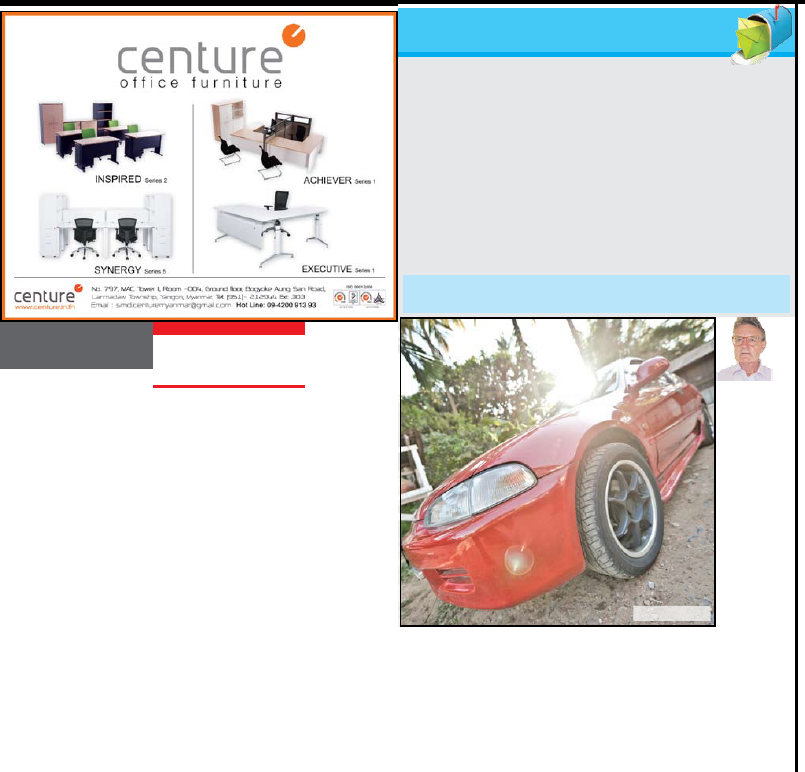







n
ews
3
the
M
yanMar
t
iMes
July 23 - 29, 2012
By Victoria Bruce andJuliet Shwe Gaung
THE head of the ExtractiveIndustries TransparencyInitiative said the outcome of his team’s visit to Myanmarlast week was “well aboveexpectations”.The visit included meetingswith nine governmentministers, almost a dozencivil society organisations,foreign energy firms andDaw Aung San Suu Kyi,who has been vocal inher advocacy for greatertransparency in Myanmar’sextractive industries.Mr Jonas Moberg, headof the EITI InternationalSecretariat, said at a pressconference on July 17 he was“very encouraged” by thediscussions he had duringthe two-day visit.The government has onseveral occasions said itplans to sign up to EITI,which works on theprinciple that companiesand governments shoulddisclose payments fornatural resources. Whileit has not yet submittedan application, Mr Mobergsaid Minister for IndustryU Soe Thein had “verystrongly” reaffirmed thegovernment’s commitmentto implementing EITI and toensuring rapid progress interms of implementation.He also expressed a“willingness to work withall parties of the society tomake sure that this is a goodprocess”, Mr Moberg said.If Myanmar followsthe EITI standard, thepayment figures will bemade public through anEITI report, where the taxand royalty payments areindependently verified andreconciled, and the peoplewill be in a position to holdthe government to accountfor the management of resources and revenues.The process is overseen bya multi-stakeholder group of government, companies andcivil society.“The EITI is a tool tobe able to better hold thegovernment to account forhow it is managing thesector,” said Mr Moberg.He said transparency is notan end in itself but a meansof improving accountability,fighting corruption, andbuilding trust and confidencein how extractive industriesare managed.Thirty-six countriesare implementing theEITI standard, includingIndonesia, East Timor andMongolia.“Governments implementthis standard and they thencommit to work with civilsociety and the operatingcompanies in ensuringtransparency,” he said.Dr Win Naing, a consultantgeologist with GeotecminexConsultants in Singapore,said the government shouldbe applauded for its effortsto foster transparency inthe country’s extractivesectors.He said joining EITI willincrease public trust inthe government and bringgreater benefits for thecountry from resourceextraction.The EITI mission came just days after the USannounced it would relaxa ban on investment,including in the energysector, and a visit by seniorUS officials and executivesfrom 38 companies.“Oil companies Chevron,ConocoPhillips andExxonMobil participatedin the Myanmar trip, alongwith companies in othersectors such as Dell, FedEx,Google, Procter & Gambleand Time Warner. All of them are aware of EITI,”said Dr Win Naing.Mr Moberg said thatthe practices of largerinternational oil and gasand mining companies hadimproved quite drasticallyin the past decade. “I thinkthere is a lot of progressmade,” he said.“But we have to continueto work for transparencyand make sure everything ispublic and there are as littlepossibilities as possible forany black books.“In many countries we’vealso seen how the EITIstarted with oil and gas andmining and can expand toother sectors.”EITI Secretariat’salternate policy adviserMs Dyveke Rogan saidallocation of revenue fromnatural resources was thegovernment’s responsibilityand not part of thestandard EITI reportingrequirements.“There are countrieswhere the reporting coverssome sub-national transfers,such as revenue-sharingagreements between centraland regional governments– but this is not part of theminimum requirements,”she said.She also said that theEITI Secretariat requiredsignatories to have a“free space” for civilsociety organisations toassess adherence to EITIprinciples.“The EITI rules are quiteclear on that there needsto be free space for civilsociety participation andthat will be one of the issuesthe international board willlook at when it considers[Myanmar’s] application,”he said.
By Sandar Lwin
AMERICAN corporate giantGeneral Electric plans toopen a representative officein Yangon in the wake of the recent suspension of aban on US investment inMyanmar, a company officialsaid last week.Stuart Dean, presidentand chief executive officerof GE’s Southeast Asiaarm, said the office wouldspearhead his company’spush into infrastructuredevelopment projects.“We applied for arepresentative office inMyanmar. We hope that willbe approved soon,” he saidat a signing ceremony forsale and purchase contractsbetween GE Healthcare andtwo local private hospitals onJuly 14.“GE is an infrastructurecompany and Myanmarneeds a lot of infrastructure… so we believe we canplay a constructive andhelpful role in buildingthat infrastructure withhigh quality, highly durableinfrastructure that makesgood economic sense forthe people [of Myanmar],”he said.GE is negotiating apotential investment in thepower generation sectorwith the governmentand is already supplyingmedical equipment throughits authorised dealer, SeaLion.“We are working veryclosely with the Ministryof Electric Power andothers in the government tounderstand what is the bestsolution to try to provide thepower not only in the shortterm but in the long term,”Mr Dean said.“We have mobile gasturbines that could beinstalled very quickly. Butthe key is you need gas andyou also need to be able to[connect] with the grid. Sothat is the similar questionthat the team from GE andthe government are workingto try to answer,” he said.The sale and purchasedeals were signed onJuly 14, just two daysafter President Obamaannounced the suspensionof an investment ban. A Congress-imposed ban onMyanmar exports to theUS remains in place but MrDean said “there is nothingthat GE wants to do thatwe cannot do” under theexisting sanctions. “I haveno opinion on the remainingsanctions because it does notimpact on GE,” he added. Also present at the signingceremony were members of the US-ASEAN BusinessCouncil’s Myanmar BusinessMission 2012 and US officials,including undersecretary of state for economic growth,energy and the environment,Mr Robert Hormats, andundersecretary of commercefor international trade MrFrancisco Sanchez.During his meeting withthe mission, Pyithu HluttawSpeaker Thura U ShweMann urged the US to liftthe ban on Myanmar importsto ensure trade was not “one-sided”.Mr Sanchez said at theJuly 14 ceremony thatbilateral business relationswere based on mutualrespect and benefit.“I’m excited about thisbecause in many ways thissigning symbolises a newchapter in the relationshipbetween our two countriesand in particular acommercial relationship. Itis a relationship that willbe based on mutual respectand mutual benefit. And Ihope this is the first of manysingings to come,” he said.
US firm GEto open officein Yangon
Govt gives positive signals on EITI
Mr Jonas Moberg, head of the Extractive Industries Transparency Initiative’s InternationalSecretariat, speaks at a press conference in Yangon on July 17.
Pic: Boothee
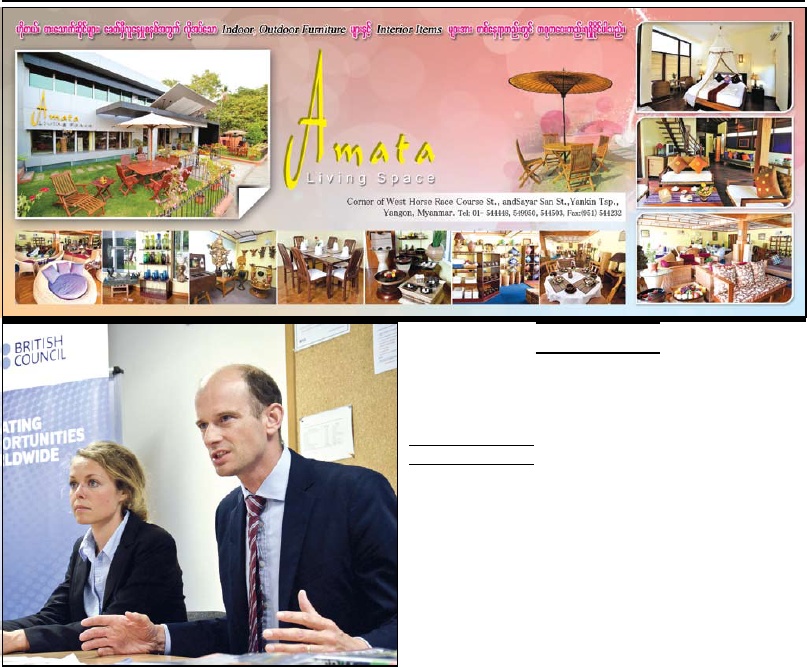



検索履歴:
結果00中00
00結果次の結果
p.
Notes
Post Note
